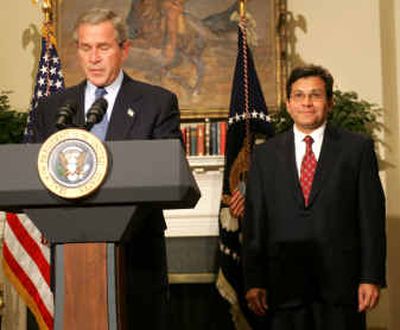Gonzales nominated to succeed Ashcroft

WASHINGTON – President Bush paved the way for Alberto Gonzales to become the nation’s first Hispanic attorney general on Wednesday, nominating his White House counsel and longtime friend from Texas to replace departing John Ashcroft.
Bush called Gonzales “a calm and steady voice in times of crisis.”
“His sharp intellect and sound judgment have helped shape our policies in the war on terror,” Bush said, with Gonzales by his side in the Roosevelt Room of the White House.
But it’s that role as a key architect of the administration’s anti-terrorism strategy that could prove most vexing for Gonzales as he faces confirmation in the U.S. Senate.
The former Texas Supreme Court judge was a staunch supporter of controversial detention policies – since rebuked by the U.S. Supreme Court – that denied even some U.S. citizens access to a lawyer or the courts. And Gonzales has come under fire for memos he authored that seemingly justify the use of torture. Critics contend such memos set the stage for the Abu Ghraib prison scandal in Iraq. In one, Gonzales called Geneva Convention protections for prisoners “quaint” and “obsolete.”
“Few images have done more to scar our nation’s image at home and abroad than the terrible pictures of prisoners being abused in Iraq,” Ralph Neas, president of the liberal advocacy group People for the American Way, said Wednesday.
Gonzales also has faced criticism for pushing the administration’s anti-affirmative action position in twin cases from the University of Michigan in 2003 and for defending the right of Vice President Dick Cheney to keep secret his meetings with energy industry officials.
“These are not small issues,” Anthony Romero, executive director of the American Civil Liberties Union, said in an interview. “It’s essential that the Senate ask the tough questions here.”
Still, the immediate reaction among Democrats on the Senate Judiciary Committee and their staff members was that the pick could have been much worse and that Gonzales fared well in comparison to Ashcroft, who was beloved by religious conservatives but vilified by civil liberties advocates. Ashcroft’s resignation was announced Tuesday.
“I can tell you already he’s a better candidate than John Ashcroft,” said Sen. Charles Schumer, D-N.Y., one of the panel’s more liberal members.
The committee’s top Democrat, Sen. Patrick Leahy of Vermont, also sounded a conciliatory note, saying, “I like and respect Judge Gonzales.”
Leahy, however, warned that he expected answers at the confirmation hearings on issues that the Justice Department has been reticent about, such as the use of the police and surveillance powers in the Patriot Act and the administration’s policy on torture.
Gonzales pledged Wednesday to “make America better, safer and stronger.”
Most experts predicted that, barring some unflattering new revelation, Gonzales would be confirmed by the Republican-controlled Senate.
“He will clearly be approved,” said Stephen Hess, a government scholar at the Brookings Institution. “But this is not going to be one of those 99-1 approvals. This will not be a cakewalk.”
Reaction mixed among Latinos
Bush won re-election to a second term with better-than-expected support from the Latino community. And although he stands to make history by nominating Gonzales to the top Cabinet post, the response from the Hispanic community was mixed Wednesday.
The Mexican American Legal Defense and Education Fund said it was still reviewing Gonzales’ record.
“It has yet to be seen whether or not Gonzales would be the best fit for our community,” MALDEF President and General Counsel Ann Marie Tallman said.
The National Council of La Raza was more enthusiastic, praising Bush for making the appointment of a Hispanic one of his first actions since being re-elected and predicting that Gonzales’ nomination would be well received in the Latino community.
The son of migrant workers, Gonzales grew up one of eight siblings in a two-bedroom house in Texas. He joined the Air Force, graduated from Harvard Law School and joined the prestigious Houston law firm of Vinson & Elkins.
Gonzales agreed to work as Bush’s counsel after he was elected governor of Texas in 1994, and their paths have been linked ever since. Bush tapped Gonzales to be his secretary of state in 1997, and two years later he appointed him to fill a vacancy on the Texas Supreme Court.
While there, he drew the ire of anti-abortion conservatives when he sided with the moderates in ruling that Texas law didn’t require a teenage girl seeking an abortion to notify her parents. Nonetheless, when Bush arrived at the White House, he brought Gonzales with him. From his office in the West Wing, Gonzales has played a pivotal behind-the-scenes role in shaping the administration’s legal policy.
He played a rare public role when memos bearing his name surfaced in connection with the administration’s torture policies and the Abu Ghraib prison scandal. In a 2002 memo, Gonzales wrote that the president had the power to ignore international treaties condemning torture during times of war.
The Center for Constitutional Rights, Amnesty International and other human rights groups cited the torture memos in raising questions about Gonzales’ nomination on Wednesday.
But groups that were skeptical about Gonzales’ conservative credentials when his name was being floated as a possible U.S. Supreme Court nominee voiced support for his nomination to take over the nation’s top law enforcement post.